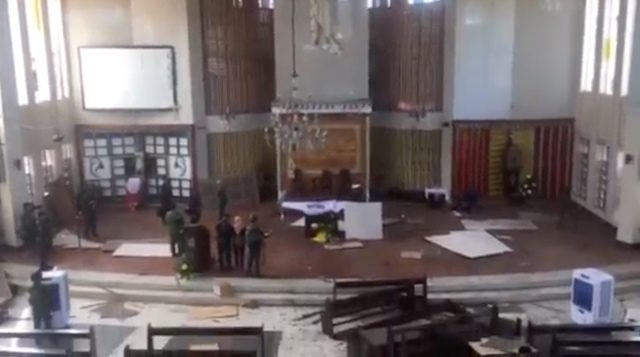SUMMARY
This is AI generated summarization, which may have errors. For context, always refer to the full article.

MANILA, Philippines – The first powerful blast shattered windows, smashed church pews, and maimed bodies in Jolo on Sunday, January 27. On Monday morning, January 28, the altar stood unshaken as Manila-based officials arrived for an ocular.
Philippine National Police (PNP) chief Director General Oscar Albayalde and other generals flew to the blast site to check the extent of the destruction caused by the twin blasts at the Jolo Cathedral.
Albayalde told reporters after his visit that the bombs were likely detonated remotely through a cellphone. The bomb squad is still looking for fragments for more conclusive tests. (READ: What we know so far in the Jolo Cathedral bombing)
The Jolo Cathedral was bombed on Sunday as around 100 people were hearing their morning Mass. (READ: At least 20 dead in Jolo Cathedral bombing)
Police said a first improvised explosive device detonated at around 8:58 am – as the Mass was ongoing – targeting the civilians. Around 15 seconds after, another exploded at the cathedral’s entrance as government troopers came to respond.
At least 23 people were killed and more than a hundred others were wounded from the blasts. The death toll rose as of February 4. (READ: LIST: Jolo Cathedral bombings, attacks since 2000)
Below are the videos from Albayalde’s visit, as compiled by Rappler.
– Rappler.com
Add a comment
How does this make you feel?
There are no comments yet. Add your comment to start the conversation.